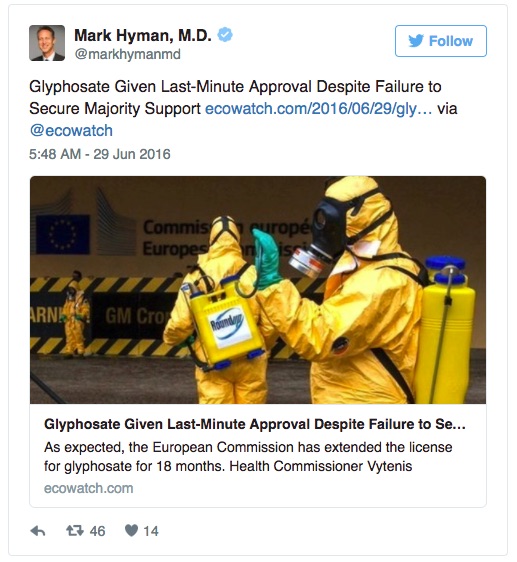One of the biggest concerns about the cultivation of genetically modified crops is the rise of superweeds caused by the overuse of glyphosate, the main ingredient in Monsanto’s best-selling Roundup and other pesticides.
So, in an effort to beat back these herbicide-defying weeds, Monsanto and DuPont have agreed to sell an even stronger weed killer to go with their genetically modified seeds.

The rival seed and agrichemical companies have signed a multi-year supply agreement for the weed killer dicamba in the U.S. and Canada, Reuters reported. The new product, DuPont FeXapan herbicide plus VaporGrip Technology, will go with Monsanto’s new Roundup Ready 2 Xtend soybeans which are genetically altered to resist dicamba and glyphosate.
It’s clear that Monsanto has high hopes for its latest project. According to Reuters, the company invested more than $1 billion in a dicamba production facility in Luling, Louisiana, to meet the demand it predicts. Xtend soybeans were planted on 1 million acres in the U.S. this year, but the company expects 15 million acres to be planted with the GMO soybeans next season and 55 million acres by 2019.
Monsanto’s bet on dicamba represents a step away from the company’s reliance on its “bread-and-butter glyphosate herbicide business,” Reuters noted last year. Glyphosate, the world’s most widely applied herbicide, has faced major controversy ever since the World Health Organization’s International Agency cancer research arm linked the compound to cancer last year. Glyphosate’s future in the Europe Union is also uncertain, as a number of countries have expressed fears over the safety of the product.

According to Dr. Nathan Donley, a scientist at the Center for Biological Diversity, Monsanto’s own analysis has indicated that dicamba use on cotton and soy will rise from less than 1 million pounds to more than 25 million pounds used per year. This will only create superweeds that are resistant both to glyphosate and dicamba, Donley told EcoWatch.
“The indiscriminate use of glyphosate created these resistant superweeds in the first place and now these companies want farmers to indiscriminately use dicamba. You don’t have to be a genius to know how this will end,” Donley said.
“We’ve been told for so long that genetically engineered crops were going to reduce pesticide use, but it’s a complete farce. Now two pesticides are being used where one used to suffice. Five years from now it will be three and so on and so forth.”
Donley said that dicamba-resistant weeds have already been found in Kansas and Nebraska, adding, “The problem has already been identified and this is not the solution.”
As for potential ecological impacts or threats to plants or animals, Donley said the U.S. Environmental Protection Agency (EPA) has “still not analyzed how dicamba use will affect endangered species so we know absolutely nothing of the potential harms to endangered or threatened species from the use of this herbicide.”
He explained that dicamba, more so than most other pesticides, is extremely prone to spray drift, meaning that it likes to move offsite through the atmosphere.
“There is a great potential for damage to nearby crops that are not dicamba resistant, as well as damage to native plants that live in the field margins,” Donley said. “These plants provide some of the only habitat and nourishment for many species of animals that live in the zone of agriculture in the Midwest.”
The EPA considers dicamba safe for both humans and the environment but admitted “we are concerned about the possibility that the use of dicamba could result in weeds becoming resistant to dicamba.”
While dicamba has been around for several decades, the EPA has not yet approved the use of dicamba on genetically engineered cotton and soybeans. However, according to Donley, the agency is expected to give approval soon. The EPA will also need to approve the new herbicide as well.
